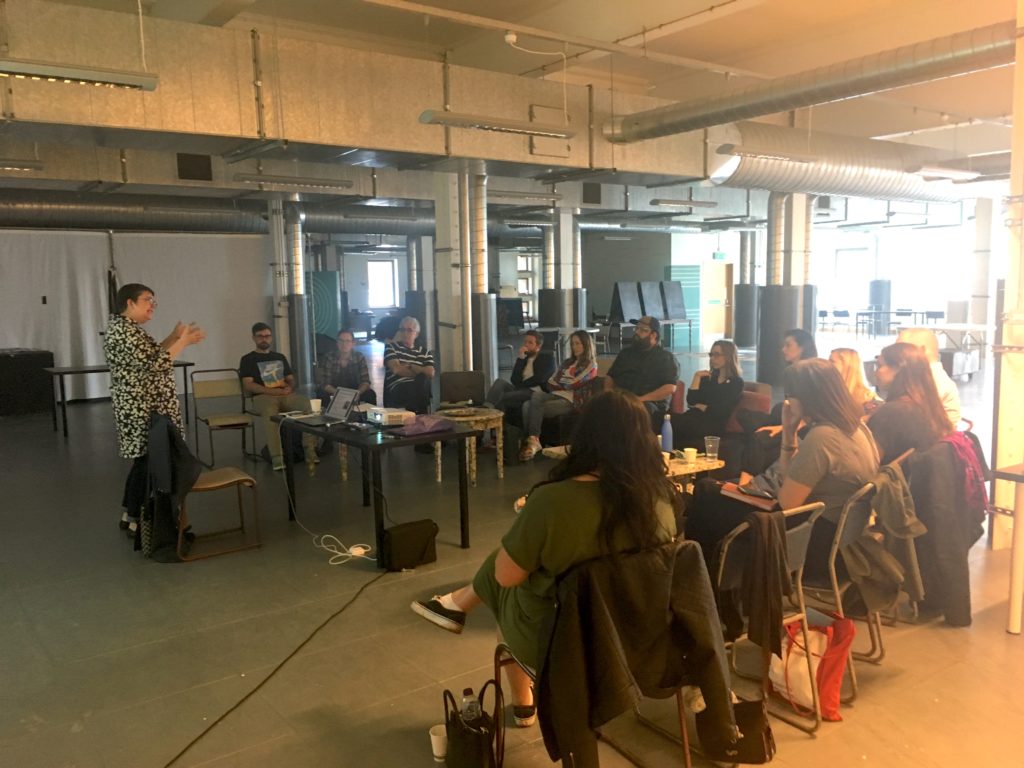
20.06.19

Fabric – a creative leadership programme for the city –have been developed by Creative Dundee to offer time and peer support for emerging and current leaders in Dundee to explore, reflect on and build their vision for the future for their own practice/work and for the city’s creative and cultural sectors. A group of 20 people have met on a monthly basis to share knowledge, experience and ideas around key connecting themes – creative learning, equalities & diversity, digital, environment – and for this additional session, they explored techniques and tools for peer mentoring with the workshop leader, Carol Sinclair.
Mentoring is to support and encourage people to manage their own learning in order that they may maximise their potential, develop their skills, improve their performance & become the person they want to be.
– Eric Parsloe, The Oxford School of Coaching & MentoringMentoring is a goal oriented process that supports learning. It seeks to compliment existing sources of learning, development & support.
– Glasgow Mentoring NetworkPeer mentoring may be a one-on-one relationship or experienced in a group.
– Art of Mentoring
We started the morning by defining peer mentoring. As opposed to a top-down approach, it’s more than sharing your wisdom. It is, in a nutshell, about helping the person you’re mentoring to clarify what they want to do and how they want to go about it. It’s is also a goal-oriented process, which can express in one meeting or develop into a relationship. This allocated and focused time of mentoring should help us think differently, bring new perspectives and ask challenging questions – to help maximise the mentee’s potential, understand what’s really important to them.
Peer-mentoring is an exchange, which demands trust and accountability from both sides. It’s about the connections you make and nurture in your community, both naturally and by design. When a peer-mentoring relationship is formalised, setting goals and checking-in is an essential part of the process, although reaching these goals should not be the aim of the peer mentoring relationship. Sometimes, people struggle to see themselves as a ‘mentor’ and you could then identify them as ‘secret mentor’ – a person whom you take inspiration and learnings from, who leads you by example, without taking the credit for it.

We continued the conversation by identifying the skills needed in the context of peer mentoring. After some chats, we discovered that there were many practical and transferable skills as well as general knowledge in the room which we can draw from our respective work experiences, as well as many qualities that make the participants already great mentors.
The skills and qualities in the room included:
We also discussed compassionate listening and the art of asking good questions as an important part of peer-mentoring. It’s often enough to simply speak a problem out-loud – or make something through an art medium – to realise that we already have the solutions for it.
Active listening is a way of seeing – give your full attention and create space for listening – hearing – not make assumptions on what has been said and pay attention to the words – and speaking – have trustworthy and clear communication.
We then went into an active listening exercise, paired up and talked/listened through a problem we have without trying to resolve the other one’s problem by asking neutral questions that keep the conversation going. While people sharing their problem would have gotten resolutions themselves, we noticed some interesting insights:
It can also feel counter-intuitive if you have not practice ‘active listening’ before. Just remember when you learnt how to ride a bike/drive a car or master a new art form/creative practice. Now very familiar to you, you were once feeling incompetent at it, going through these stages: (1) unconsciously incompetent, (2) consciously incompetent, (3) consciously competent, (4) unconsciously competent.
That’s it! Fabric 2018-19 came to its end, watch this space for the next year programme and how to get involved. In the meantime, find out more about Fabric, this year’s content, sessions and group here.
So good to catch up the Fabric Dundee group this morning, discussing the practice of mentoring. Lots of refreshing & inspiring conversations; as always! Thanks so much for having me @Creative_Dundee…see you next year! 🤩
— Rebecca Foy (@RebeccaFoy15) June 18, 2019

If you would like to support us in creating even better content, please consider joining or supporting our Amps Community.